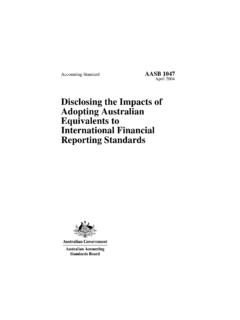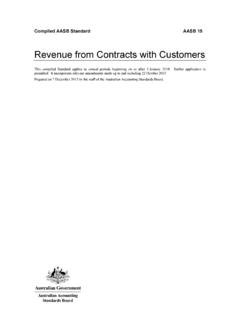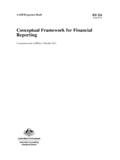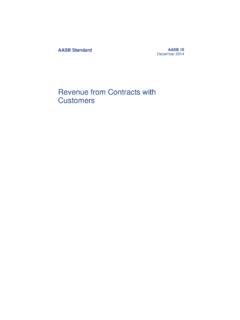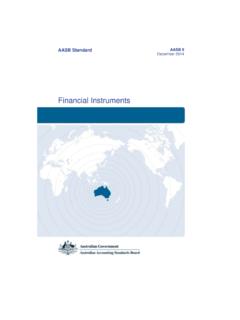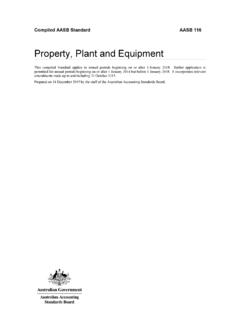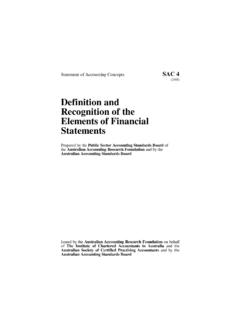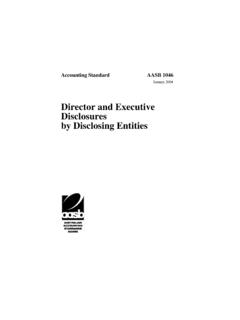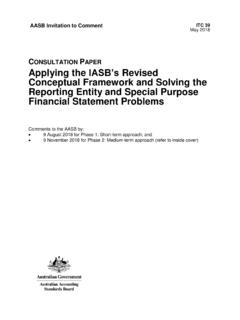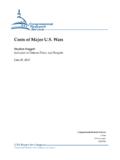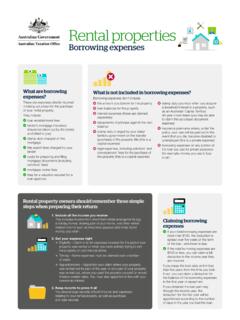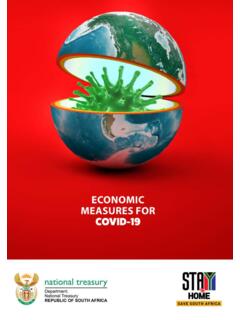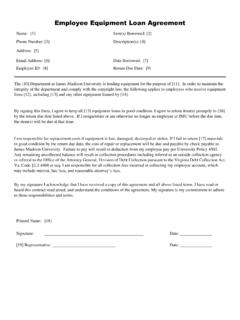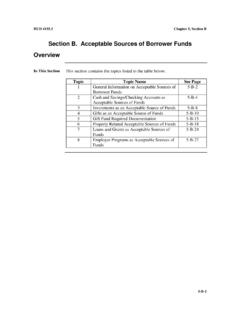Transcription of Borrowing Costs - Australian Accounting Standards Board
1 AASB Standard AASB 123 August 2015 Borrowing Costs Federal Register of Legislative Instruments F2015L01586 AASB 123 2 COPYRIGHT Obtaining a copy of this Accounting Standard This Standard is available on the AASB website: Australian Accounting Standards Board PO Box 204 Collins Street West Victoria 8007 AUSTRALIA Phone: (03) 9617 7637 E-mail: Website: Other enquiries Phone: (03) 9617 7600 E-mail: COPYRIGHT Commonwealth of Australia 2015 This AASB Standard contains IFRS Foundation copyright material. Reproduction within Australia in unaltered form (retaining this notice) is permitted for personal and non-commercial use subject to the inclusion of an acknowledgment of the source.
2 Requests and enquiries concerning reproduction and rights for commercial purposes within Australia should be addressed to The Director of Finance and Administration, Australian Accounting Standards Board , PO Box 204, Collins Street West, Victoria 8007. All existing rights in this material are reserved outside Australia. Reproduction outside Australia in unaltered form (retaining this notice) is permitted for personal and non-commercial use only. Further information and requests for authorisation to reproduce for commercial purposes outside Australia should be addressed to the IFRS Foundation at ISSN 1036-4803 Federal Register of Legislative Instruments F2015L01586 AASB 123 3 CONTENTS Contents COMPARISON WITH IAS 23 Accounting STANDARD AASB 123 Borrowing Costs from paragraph CORE PRINCIPLE 1 SCOPE 2 DEFINITIONS 5 RECOGNITION 8 Borrowing Costs eligible for capitalisation 10 Excess of the carrying amount of the qualifying asset over recoverable amount 16 Commencement of capitalisation 17 Suspension of capitalisation 20 Cessation of capitalisation 22 DISCLOSURE 26 TRANSITIONAL
3 PROVISIONS EFFECTIVE DATE 29 WITHDRAWAL OF IAS 23 (REVISED 1993) 30 COMMENCEMENT OF THE LEGISLATIVE INSTRUMENT WITHDRAWAL OF AASB PRONOUNCEMENTS APPENDIX A Australian reduced disclosure requirements DELETED IAS 23 TEXT BASIS FOR CONCLUSIONS AVAILABLE ON THE AASB WEBSITE Basis for Conclusions on IAS 23 Australian Accounting Standard AASB 123 Borrowing Costs is set out in paragraphs 1 and Appendix A. All the paragraphs have equal authority. Paragraphs in bold type state the main principles. AASB 123 is to be read in the context of other Australian Accounting Standards , including AASB 1048 Interpretation of Standards , which identifies the Australian Accounting Interpretations, and AASB 1057 Application of Australian Accounting Standards .
4 In the absence of explicit guidance, AASB 108 Accounting Policies, Changes in Accounting Estimates and Errors provides a basis for selecting and applying Accounting policies. Federal Register of Legislative Instruments F2015L01586 AASB 123 4 COMPARISON Comparison with IAS 23 AASB 123 Borrowing Costs incorporates IAS 23 Borrowing Costs issued by the International Accounting Standards Board (IASB). Australian -specific paragraphs (which are not included in IAS 23) are identified with the prefix Aus or RDR . Paragraphs that apply only to not-for-profit entities begin by identifying their limited applicability. Tier 1 For-profit entities complying with AASB 123 also comply with IAS 23.
5 Not-for-profit entities compliance with IAS 23 will depend on whether any Aus paragraphs that specifically apply to not-for-profit entities provide additional guidance or contain applicable requirements that are inconsistent with IAS 23. Tier 2 Entities preparing general purpose financial statements under Australian Accounting Standards Reduced Disclosure Requirements (Tier 2) will not be in compliance with IFRSs. AASB 1053 Application of Tiers of Australian Accounting Standards explains the two tiers of reporting requirements. Federal Register of Legislative Instruments F2015L01586 AASB 123 5 STANDARD Accounting Standard AASB 123 The Australian Accounting Standards Board makes Accounting Standard AASB 123 Borrowing Costs under section 334 of the Corporations Act 2001.
6 Kris Peach Dated 7 August 2015 Chair AASB Accounting Standard AASB 123 Borrowing Costs Core principle 1 Borrowing Costs that are directly attributable to the acquisition, construction or production of a qualifying asset form part of the cost of that asset. Other Borrowing Costs are recognised as an expense. In respect of not-for-profit public sector entities, Borrowing Costs may be expensed in accordance with paragraph Scope 2 An entity shall apply this Standard in Accounting for Borrowing Costs . 3 The Standard does not deal with the actual or imputed cost of equity, including preferred capital not classified as a liability.
7 4 An entity is not required to apply the Standard to Borrowing Costs directly attributable to the acquisition, construction or production of: (a) a qualifying asset measured at fair value, for example a biological asset within the scope of AASB 141 Agriculture; or (b) inventories that are manufactured, or otherwise produced, in large quantities on a repetitive basis. Definitions 5 This Standard uses the following terms with the meanings specified: Borrowing Costs are interest and other Costs that an entity incurs in connection with the Borrowing of funds. A qualifying asset is an asset that necessarily takes a substantial period of time to get ready for its intended use or sale.
8 6 Borrowing Costs may include: (a) interest expense calculated using the effective interest method as described in AASB 9; (b) [deleted] (c) [deleted] (d) finance charges in respect of finance leases recognised in accordance with AASB 117 Leases; and (e) exchange differences arising from foreign currency borrowings to the extent that they are regarded as an adjustment to interest Costs . 7 Depending on the circumstances, any of the following may be qualifying assets: (a) inventories (b) manufacturing plants (c) power generation facilities (d) intangible assets Federal Register of Legislative Instruments F2015L01586 AASB 123 6 STANDARD (e) investment properties (f) bearer plants.
9 Financial assets, and inventories that are manufactured, or otherwise produced, over a short period of time, are not qualifying assets. Assets that are ready for their intended use or sale when acquired are not qualifying assets. Recognition 8 An entity shall capitalise Borrowing Costs that are directly attributable to the acquisition, construction or production of a qualifying asset as part of the cost of that asset. An entity shall recognise other Borrowing Costs as an expense in the period in which it incurs them. A not-for-profit public sector entity may elect to recognise Borrowing Costs as an expense in the period in which they are incurred regardless of how the borrowings are applied.
10 In respect of not-for-profit public sector entities, paragraphs 9 26, 27 and 28 apply only when an entity elects to capitalise Borrowing Costs that are directly attributable to the acquisition, construction or production of a qualifying asset as part of the cost of that asset. 9 Borrowing Costs that are directly attributable to the acquisition, construction or production of a qualifying asset are included in the cost of that asset. Such Borrowing Costs are capitalised as part of the cost of the asset when it is probable that they will result in future economic benefits to the entity and the Costs can be measured reliably.
